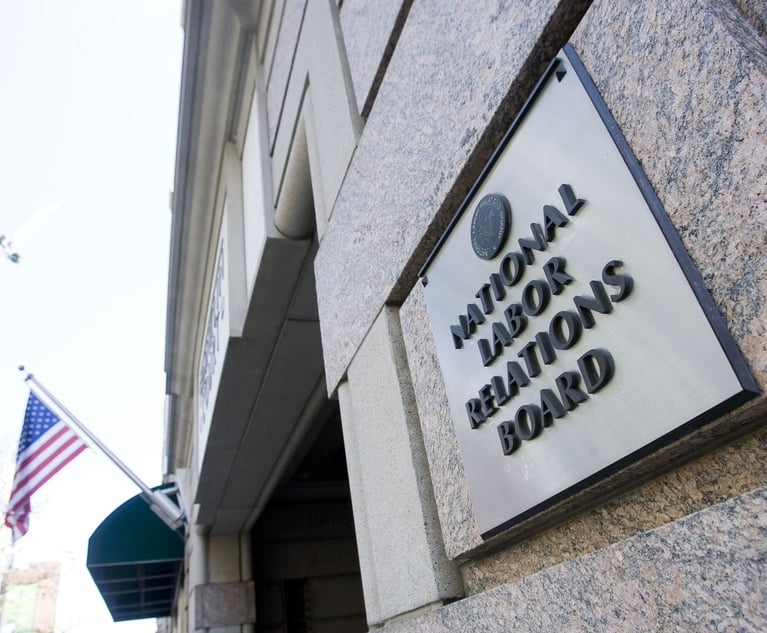JPMorgan Must Face Gender Pay Discrimination Lawsuit, U.S. Labor Panel Says
The Labor Department's suit alleges JPM paid certain female employees less than male counterparts.
October 16, 2017 at 12:50 PM
4 minute read

JPMorgan Chase & Co. must face a U.S. Labor Department lawsuit that alleges the company systematically paid female employees less than men, a federal labor appeals panel has ruled, putting a fresh spotlight on pay equity in the financial services industry.
The decision by a three-judge Administrative Review Board panel, issued on Oct. 5 but not widely reported, marked the second time JPMorgan lost an effort to dismiss the claims. The financial institution, represented by a team from McGuireWoods, earlier failed to convince an administrative law judge to dismiss the Labor Department's allegations. The review board this month rejected a petition from the bank that could have shut down the case.
The appeals panel said JPMorgan, sued by the Labor Department in January, had not shown any “exceptional circumstances” to force an end to the case. Now, the dispute will return to an administrative judge for a final decision. The complaint seeks, among other things, an injunction barring JPMorgan from discriminating against female employees and it demands lost pay and salary adjustments for the affected class of workers.
An order against JPMorgan could jeopardize the continuation of current federal contracts and even bar any future contracts.
The case against JPMorgan will move forward concurrently with two other closely watched Labor Department actions against major U.S. companies. The Labor Department is investigating Google Inc. for alleged gender-based pay disparities. Separately, Oracle Corp. was sued on Jan. 17 for alleged discriminatory employment practices, including pay equity violations. Oracle called the Labor Department's complaint “politically motivated.”
Read more: Special Report: The Push for Pay Equity
McGuireWoods partner William Doyle Jr. in North Carolina, a lawyer for JPMorgan, was not immediately reached for comment Monday. Doyle, who joined the firm in 2015, formerly served as deputy director of the Labor Department's Office of Federal Contract Compliance Programs, the enforcement and regulatory arm that conducts compliance review of contractors.
A Labor Department spokesperson declined to comment Monday about the Administrative Review Board ruling. A representative from JPMorgan also did not immediatelty comment.
The Labor Department sued JPMorgan for alleged violations of an executive order that forbids federal contractors from discriminating against employees on the basis of race, color, religion, and sex. A review conducted by the Labor Department's contract compliance division said JPMorgan since May 2012 had paid 93 women in four categories—including project management and technology—less than male colleagues in the same roles.
“The company continues to fall short of its obligations, compensating a group of female employees significantly less than their male counterparts and thereby failing to eliminate sex discrimination from its compensation process,” according to the Labor Department's complaint. Federal regulators said the pay disparity “remains after adjusting for differences in legitimate compensation-determining factors.”
The Labor Department said it presented its findings to JPMorgan in March 2015 and provided “corrective actions” that the financial institution could employ to resolve the alleged violations. The agency a year later moved to begin the enforcement action after failing to reach voluntary compliance through “conciliation and persuasion.”
The complaint against JPMorgan was filed on Jan. 17 by then-Labor Department solicitor M. Patricia Smith, now senior counsel at the National Employment Law Project in Washington. The Trump administration in September nominated Washington-based Kirkland & Ellis litigation partner Kate O'Scannlain for solicitor, the Labor Department's top lawyer. Her confirmation hearing is not yet scheduled.
The Trump administration has suggested making changes to the Labor Department's federal contracts compliance office, merging the division into the U.S. Equal Employment Opportunity Commission. Trump officials contend the move would reduce the regulatory burden on employers and give workers “one door” in which to bring workplace discrimination claims. The proposal drew criticism from both labor advocates and the business community.
Erin Mulvaney in Washington contributed to this report.
This content has been archived. It is available through our partners, LexisNexis® and Bloomberg Law.
To view this content, please continue to their sites.
Not a Lexis Subscriber?
Subscribe Now
Not a Bloomberg Law Subscriber?
Subscribe Now
NOT FOR REPRINT
© 2025 ALM Global, LLC, All Rights Reserved. Request academic re-use from www.copyright.com. All other uses, submit a request to [email protected]. For more information visit Asset & Logo Licensing.
You Might Like
View All
Troutman Pepper Says Ex-Associate Who Alleged Racial Discrimination Lost Job Because of Failure to Improve
6 minute read
Trump Fires EEOC Commissioners, Kneecapping Democrat-Controlled Civil Rights Agency

Trump’s Firing of NLRB Member Could Spark Review of Supreme Court Precedent

Testing Legal Authority, Trump Fires NLRB Member, Leaving Panel Without Quorum
3 minute readTrending Stories
- 1Public Notices/Calendars
- 2Wednesday Newspaper
- 3Decision of the Day: Qui Tam Relators Do Not Plausibly Claim Firm Avoided Tax Obligations Through Visa Applications, Circuit Finds
- 4Judicial Ethics Opinion 24-116
- 5Big Law Firms Sheppard Mullin, Morgan Lewis and Baker Botts Add Partners in Houston
Who Got The Work
J. Brugh Lower of Gibbons has entered an appearance for industrial equipment supplier Devco Corporation in a pending trademark infringement lawsuit. The suit, accusing the defendant of selling knock-off Graco products, was filed Dec. 18 in New Jersey District Court by Rivkin Radler on behalf of Graco Inc. and Graco Minnesota. The case, assigned to U.S. District Judge Zahid N. Quraishi, is 3:24-cv-11294, Graco Inc. et al v. Devco Corporation.
Who Got The Work
Rebecca Maller-Stein and Kent A. Yalowitz of Arnold & Porter Kaye Scholer have entered their appearances for Hanaco Venture Capital and its executives, Lior Prosor and David Frankel, in a pending securities lawsuit. The action, filed on Dec. 24 in New York Southern District Court by Zell, Aron & Co. on behalf of Goldeneye Advisors, accuses the defendants of negligently and fraudulently managing the plaintiff's $1 million investment. The case, assigned to U.S. District Judge Vernon S. Broderick, is 1:24-cv-09918, Goldeneye Advisors, LLC v. Hanaco Venture Capital, Ltd. et al.
Who Got The Work
Attorneys from A&O Shearman has stepped in as defense counsel for Toronto-Dominion Bank and other defendants in a pending securities class action. The suit, filed Dec. 11 in New York Southern District Court by Bleichmar Fonti & Auld, accuses the defendants of concealing the bank's 'pervasive' deficiencies in regards to its compliance with the Bank Secrecy Act and the quality of its anti-money laundering controls. The case, assigned to U.S. District Judge Arun Subramanian, is 1:24-cv-09445, Gonzalez v. The Toronto-Dominion Bank et al.
Who Got The Work
Crown Castle International, a Pennsylvania company providing shared communications infrastructure, has turned to Luke D. Wolf of Gordon Rees Scully Mansukhani to fend off a pending breach-of-contract lawsuit. The court action, filed Nov. 25 in Michigan Eastern District Court by Hooper Hathaway PC on behalf of The Town Residences LLC, accuses Crown Castle of failing to transfer approximately $30,000 in utility payments from T-Mobile in breach of a roof-top lease and assignment agreement. The case, assigned to U.S. District Judge Susan K. Declercq, is 2:24-cv-13131, The Town Residences LLC v. T-Mobile US, Inc. et al.
Who Got The Work
Wilfred P. Coronato and Daniel M. Schwartz of McCarter & English have stepped in as defense counsel to Electrolux Home Products Inc. in a pending product liability lawsuit. The court action, filed Nov. 26 in New York Eastern District Court by Poulos Lopiccolo PC and Nagel Rice LLP on behalf of David Stern, alleges that the defendant's refrigerators’ drawers and shelving repeatedly break and fall apart within months after purchase. The case, assigned to U.S. District Judge Joan M. Azrack, is 2:24-cv-08204, Stern v. Electrolux Home Products, Inc.
Featured Firms
Law Offices of Gary Martin Hays & Associates, P.C.
(470) 294-1674
Law Offices of Mark E. Salomone
(857) 444-6468
Smith & Hassler
(713) 739-1250








